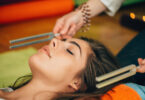Did you know that a quarter to a full third of your life is spent sleeping? That is how integral sleep is to the human body. There are a few sneaky medical issues that can come between you and a full night’s rest.
Let’s see if we can tackle those before you reach for a pill or supplement to help you sleep.
Is your insomnia causing you grief? Pick up Your Complete Guide to Better Sleep and rid yourself of your sleep worries.
1. Sleep Apnea
The word “apnea” means to stop breathing in Latin. People with sleep apnea stop breathing multiple times during sleep.
Since the body is not trying to die it sets up a safety mechanism by keeping the sleep shallow instead of deep so that when you stop breathing during sleep, you can then be aroused quickly to catch your breath.
Untreated sleep apnea causes daytime sleepiness and fatigue in excess of what you would expect. These are the kinds of people that could have a quick dose at the red light. Did I hear you say DANGEROUS?
Sleep apnea also leads to high blood pressure and strain on the right side of the heart.
Treatment:
You need to get diagnosed for sleep apnea first by taking a sleep study where you are hooked up with all kinds of wires that would record your brain waves as you sleep.
If the test comes back positive, you would need to sleep using a machine known as the CPAP (Continuous Positive Airway Pressure).
The CPAP works to prevent the obstruction of the airway by exerting the continuous pressure that prevents the tongue falling backwards as is prone to happen with sleep apnea.
Weight loss is also a must. Most sleep apnea sufferers are obese.
2. Restless Leg Syndrome
Imagine being on the verge of falling asleep only to be woken by the sensation of ants crawling up and down your leg. You try to shake them off to no avail.
Finally you get up and walk back and forth to make it go away before making another go at falling asleep.
That’s the experience of people with restless leg syndrome.
Treatment:
We (the medical community) have been using medications designed for Parkinson’s disease to treat restless leg syndrome with good results.
When low on iron, using iron supplements; available over the counter have been helpful.
Don’t try this at home without discussing with your doctor.
3. Night-time Muscle Cramps
These are cramps that usually occur in the legs severe enough to wake you up from a deep sleep.
Prevention and Treatment:
- Stay well hydrated
- Try to stretch out and get a good soak with warm water before sleep as these may prevent those pesky nighttime leg cramps.
- Discuss with your health provider if a supplement of calcium, magnesium, and or potassium is right for you.
- Some take a bedtime Tylenol or Advil during the days when cramps seem more prevalent.
- If your cramps occur frequently then get screened for low or high thyroid, anemia and restless legs syndrome.
- Once they hit though- there’s not much you can do but hop around and try to massage the hard malpositioned muscle back into place.
4. Bladder Issues
Waking up every hour to go to the bathroom will get in the way of having a restful sleep.
Treatment and Prevention
- Limiting intake of fluids especially liquids like coffee, tea or alcohol late at night would help reduce the need to frequent the bathroom at night.
- You should consider bringing it up with your doctor so you could be checked for a urinary tract infection or bladder incontinence issues. You will find Get That Bladder to Behave invaluable in this regard.
We have saved the best for last. Sneaky sleep thief #5 is the only one not directly related to you.
The rest of this article is only available to Healthgist members.
Not yet a member? Create your account now. It’s FREE!
[show_to accesslevel=’Healthgist Free Account’][show_to accesslevel=’Healthgist Membership Plus’] 5. Bed Partner Issues
I once shared a hotel room with a colleague while attending a conference. We were both trainees at the time and needed to stretch out the greenback as far as we could so we got a hotel room with 2 queen beds.
She snored so loud that I got little sleep. The only option I had was to skip the conference so I could catch up with sleep during the day. What a waste!
That was a 3 day ordeal for me but what if your sleep nemesis is the one whom you pledged “to have and to hold till death do us part” (as in your spouse)?
Your options:
- Pick up your pillow and move to the couch or the spare bedroom. Poor choice for intimacy though.
- Kick your partner out of the bed. Again, not a good option for intimacy.
- Keep up the thankless job of the midnight elbow nudges with the pleas to “turn over”.
- Have your partner get a sleep study to check for sleep apnea. Good choice, your sleep could depend on it.[/show_to]






I beg to differ on people who have sleep apnea are overweight. I suffer from this and I am normal weight. I am fine if I sleep on my side. When I sleep on my back I wake up gasping for air.
You are certainly the exception Tara and that’s why I said “most” not “all” sleep apnea sufferers are overweight. There are no absolutes when it comes to the human body for sure.